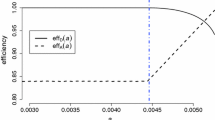Abstract
The approximate theory of optimal linear regression design leads to specific convex extremum problems for numerical solution. A conceptual algorithm is stated, whose concrete versions lead us from steepest descent type algorithms to improved gradient methods, and finally to second order methods with excellent convergence behaviour. Applications are given to symmetric multiple polynomial models of degree three or less, where invariance structures are utilized. A final section is devoted to the construction of efficientexact designs of sizeN from the optimal approximate designs. For the multifactor cubic model and some of the most popular optimality criteria (D-, A-, andI-criteria) fairly efficient exact designs are obtained, even for small sample sizeN.
Similar content being viewed by others
References
Farrell RH, Kiefer J, Walbran A (1967) Optimum multivariate designs. Proc Fifth Berkeley Sympos Math Statist Probab 1:113–138
Fedorov VV (1972) Theory of optimal experiments. Academic Press, New York
Fletcher R (1987) Practical methods of optimization. 2nd Edition, Wiley, New York
Gaffke N, Heiligers B (1995) Optimal and robust invariant designs for cubic multiple regression. Metrika 42:29–48
Gaffke N, Heiligers B (1994b) Computing optimal approximate invariant designs for cubic regression on multidimensional balls and cubes. J. Statist Planning Inference (forthcoming)
Gaffke N, Heiligers B (1994c) Second order methods for solving extremum problems from optimal linear regression design. DFG-Report 531, Institute of Mathematics, University of Augsburg
Gaffke N, Mathar R (1992) On a class of algorithms from experimental design theory. Optimization 24:91–126
Hardin RH, Sloane NJA (1993) A new approach to the construction of optimal designs. Journal of Statistical Planning and Inference 37:339–369
Heiligers B (1989) Zulässige Versuchspläne in linearen Regressionsmodellen. Dissertation, RWTH Aachen
Heiligers B, Schneider K (1992) Invariant admissible and optimal designs in cubic regression on the ν-ball. J Statist Planning Inference 31:113–125
Higgins JE, Polak E (1990) Minimizing pseudoconvex functions on convex compact sets. Journal of Optimization Theory and Applications 65:1–27
Hoel PG (1965) Minimax designs in twodimensional regression. Annals Math Statist 36:1097–1106
Karlin S, Studden WJ (1966) Tchebycheff systems: With applications in analysis and statistics. Interscience Publishers, New York
Kiefer J (1975) Optimal design: Variation in structure and performance under change of criterion. biometrika 62:277–288
Pukelsheim F (1993) Optimal design of experiments. Wiley, New York
Pukelsheim F, Rieder S (1992) Efficient rounding of approximate designs. Biometrika 79:763–770
Rockafellar RT (1970) Convex analysis. Princeton
Wynn HP (1970) The sequential generation of D-optimum experimental designs. Ann Math Statist 41:1655–1664
Author information
Authors and Affiliations
Additional information
AMS Subject Classification: 62K05.Abbreviated Title: Algorithms for Optimal Design.
Rights and permissions
About this article
Cite this article
Gaffke, N., Heiligers, B. Algorithms for optimal design with application to multiple polynomial regression. Metrika 42, 173–190 (1995). https://doi.org/10.1007/BF01894298
Issue Date:
DOI: https://doi.org/10.1007/BF01894298




